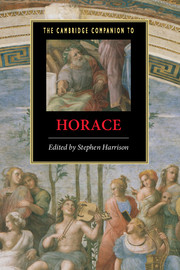Book contents
- Frontmatter
- Introduction
- Part 1: Orientations
- Part 2: Poetic Genres
- Part 3: Poetic Themes
- 12 Philosophy and ethics
- 13 Gods and religion
- 14 Friendship, patronage and Horatian sociopoetics
- 15 Wine and the symposium
- 16 Erotics and gender
- 17 Town and country
- 18 Poetics and literary criticism
- 19 Style and poetic texture
- Part 4: Receptions
- Dateline of works and major political events
- Works cited
- Index
13 - Gods and religion
from Part 3: - Poetic Themes
Published online by Cambridge University Press: 28 May 2007
- Frontmatter
- Introduction
- Part 1: Orientations
- Part 2: Poetic Genres
- Part 3: Poetic Themes
- 12 Philosophy and ethics
- 13 Gods and religion
- 14 Friendship, patronage and Horatian sociopoetics
- 15 Wine and the symposium
- 16 Erotics and gender
- 17 Town and country
- 18 Poetics and literary criticism
- 19 Style and poetic texture
- Part 4: Receptions
- Dateline of works and major political events
- Works cited
- Index
Summary
For Horace, as for all serious Roman poets, the choice of poetical form in which to compose meant selecting a model from those bequeathed by the great writers of Greece. It was to Greek models that Horace, approaching the composition of lyric verse, naturally and explicitly turned. That had important implications, not only for the manner but also for the content of the work.
Greek lyric poetry, from its origins, was intimately connected with the cult of the gods. Poems were occasional, produced for specific events, often ritual in nature. Later on, when the Alexandrian scholars set out to produce collected editions of the works of the lyric poets, by now regarded as classics, they were faced with the task of finding an intelligible system by which to arrange the mass of poetry produced for different occasions and without thought for subsequent or collected publication. One of the solutions they found was to separate the poems by the type of religious occasion for which they had been produced. Thus with Pindar the hymns, maiden songs, paeans, dithyrambs, etc., were each grouped into separate books. Only the four books of epinicians, alas, his victory songs for athletes, survived the end of antiquity. They were grouped by the festival at which the victory had been won: Olympia (Olympians), Delphi
Pytho (Pythians), etc.
- Type
- Chapter
- Information
- The Cambridge Companion to Horace , pp. 181 - 194Publisher: Cambridge University PressPrint publication year: 2007
- 2
- Cited by

